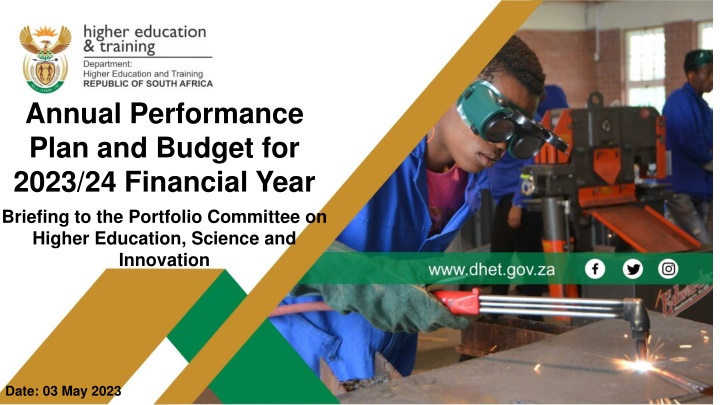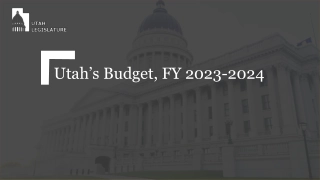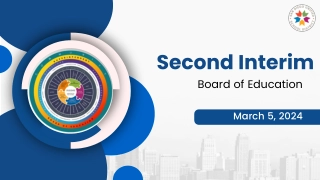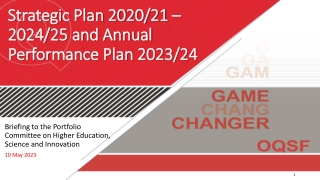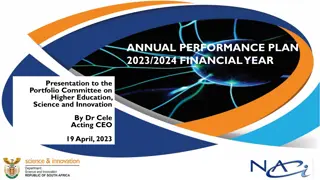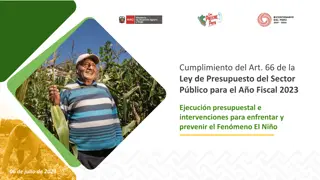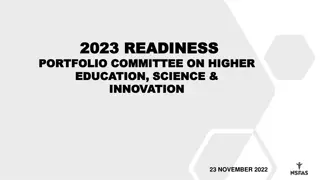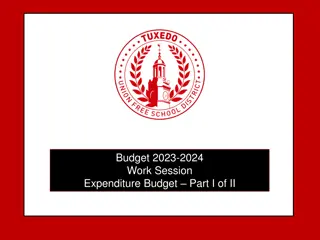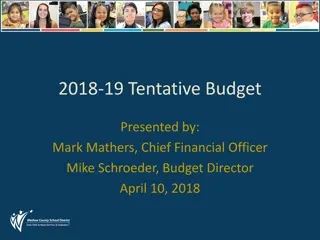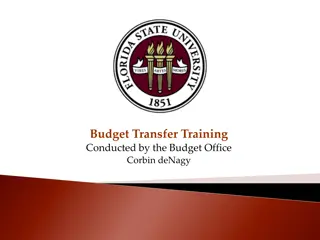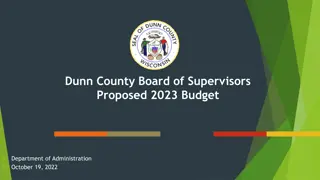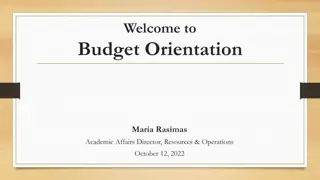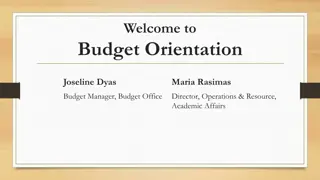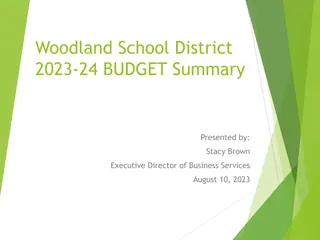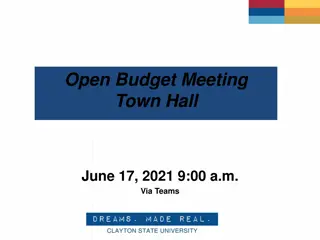Higher Education & Science Budget Plan Summary 2023/24
The briefing outlines the strategic framework for the upcoming financial year in higher education and science, emphasizing outcomes like increased access and quality teaching. It also highlights key measures of performance, sector priorities from the Presidency, and plans for expanding access through increased enrollments and funding for students.
Download Presentation

Please find below an Image/Link to download the presentation.
The content on the website is provided AS IS for your information and personal use only. It may not be sold, licensed, or shared on other websites without obtaining consent from the author.If you encounter any issues during the download, it is possible that the publisher has removed the file from their server.
You are allowed to download the files provided on this website for personal or commercial use, subject to the condition that they are used lawfully. All files are the property of their respective owners.
The content on the website is provided AS IS for your information and personal use only. It may not be sold, licensed, or shared on other websites without obtaining consent from the author.
E N D
Presentation Transcript
Annual Performance Plan and Budget for 2023/24 Financial Year Briefing to the Portfolio Committee on Higher Education, Science and Innovation Date: 03 May 2023
OUTLINE OF THE PRESENTATION Medium-Term Strategic Framework outcomes What we aim to achieve Key measures of performance Sector priorities prescribed by the Presidency Key outputs for the 2023/24 financial year Budget information: 2023/24 MTEF 2
MEDIUM MEDIUM- -TERM STRATEGIC FRAMEWORK OUTCOMES TERM STRATEGIC FRAMEWORK OUTCOMES (WHAT WE AIM TO ACHIEVE) (WHAT WE AIM TO ACHIEVE) opportunities Access to PSET provisioning Increasing participation as a result of expanded opportunities Quality Ensuring excellent teaching and learning IMPACT Improved social and economic development through the PSET system Responsiveness Addressing education and training needs of individuals, employers and society Success and efficiency Optimal use of resources in the PSET system 3
HOW WE MEASURE THE IMPACT OF OUR INTERVENTIONS Enrolments in PSET institutions Students completions Skills programmes supported by SETAs Infrastructure development support Funding support Health of our own business operations + those of entities 4
SECTOR PRIORITIES PRESCRIBED BY THE PRESIDENCY Changing the size and shape of the PSET sector Finalising Comprehensive Student Funding Model for Higher Education Establishment of the two new universities Placement of students through a funding scheme in collaboration with the NSF (targeting young people trained and placed in workplaces through various learning programmes including skills in digital and technology sector) Ensuring that TVET graduates undertake workplace experience to complete their qualifications 5
EXPANSION OF ACCESS Increase enrolments: oUniversities - from 1 110 360 (2023/24) to 1 133 864 (2025/26) oTVET colleges - from 520 000 (2023/24) to 640 000 (2025/26) oCET colleges - from 321 841 (2023/24) to 469 649 (2025/26) Increase the number of students receiving funding through NSFAS bursaries: oUniversities: from 439 659 (2023/24) to 559 884 (2025/26) oTVET colleges - from 346 258 (2023/24) to 420 000 (2025/26) Increase first-time students entering university by 2.1% from 204 000 to 208 200 6
EXPANSION OF ACCESS Increase artisan learners trained in TVET colleges from 30 000 (2023/24) to 36 000 (2025/26) Increase learners placed in Work-based Learning programmes from 110 500 (2022/23) to 200 300 (2025/26) Increase learners registered in skills development programmes from 149 000 (2022/23) to 155 500 (2025/26) Increase learners entering artisanal programmes from 23 000 (2022/23) to 37 000 (2025/26) Submit to the Minister Student Funding Implementation Framework for approval (31 October 2023) Submit to the Minister revised daft Fee Increase Regulatory Framework for approval (31 October 2023). 7
PLANNED INFRASTRUCTURE TO SUPPORT EXPANSION Development of concept designs in 2023/24 up to 30% completion of the construction of the two new universities in Ekurhuleni and Hammanskraal in 2025/26 Implement 9 projects for the provision of 28 000 student beds over the MTEF period 2/3000 (2023/24) 3/10 000 (2024/25) 4/15 000 (2025/26) Build 12 Community Learning Centres over the MTEF, starting with 3 in the 2023/24 financial year: oTswinyane in Heidelberg - Gauteng oKwa-Guqa in eMalahleni - Mpumalanga oEersterivier - Western Cape 8
Planned Infrastructure to Support Expansion Build 8 TVET college campuses over the MTEF, 2 of which will be built in 2023/24: ouMfolozi-Bhambanana Campus ouMgungundlovu-Greytown Campus Work with DUT to complete an Engineering Building as part of the Imbali Precinct project Develop concept designs for: othe Multi-Purpose Centre in Giyani and oa Satellite campus in Ulundi Ensure 6 000 students participate in work integrated learning for practical application in construction over the MTEF 9
Success and Efficiency Increase the number of students completing a university qualification from 232 000 (2023/24) to 249 509 (2025/26) Increase university graduates in: oengineering from 14 477 (2023/24) to 14 735 (2025/26) oInitial teacher education from 29 500 (2023/24) to 33 094 (2025/26) oMaster s graduates (all master s) will increase from 14 500 to 15 079 oDoctoral graduates will increase from 3 350 to 3 477 10
Success and Efficiency The number of graduates in the following fields will decrease over the MTEF period: o Natural and physical sciences - from 11 516 (2023/24) to 10 943 (2025/26) o Human health sciences - from 10 200 (2023/24) to 9 950 (2025/26) o Animal health sciences - from 1 013 (2023/24) to 925 (2025/26) Reason for the decline in targets: Universities have been registering less students from the 2021 academic year deviating from the 2020 to 2025 Enrolment Plan approved by the Minister. During the midterm review of the 2023 to 2025, some of the universities which had projected high numbers have reduced them thereby affecting the number of students graduating 11
Success and Efficiency Increase TVET college students completing N6 qualifications from 73 743 (2023/24) to 78 000 (2025/26) Increase TVET college students completing NC(V) Level 4 from 13 823 (2023/24) to 15 099 (2025/26) Ensure 4 500 students are enrolled in Pre-vocational Learning Programme in 2023/24 to improve success and increase by 1 000 over the MTEF Increase the placement of unemployed TVET students in workplaces from 10 616 in 2022/23 to 20 000 in 2023/24 12
Success and Efficiency Ensure certificates are issued to qualifying candidates within 3 months following publication of results Increase artisans development from 21 000 (2023/24) to 28 000 (2025/26) Increase learners who complete learnerships from 32 550 (2023/24) to 56 000 (2025/26) Learners who complete internships will also increase from 6 450 (2023/24) to 11 770 (2025/26) 13
Success and Efficiency Learners who complete skills programmes will increase from 105 000 (2023/24) to 130 960 (2025/26) Process qualifying trade test applications within 40 days of receipt for trade testing annually over the MTEF Increase the number of CET college students completing GETC: Level 4 from 41 200 (2023/24) to 55 000 (2025/26) 14
Improving the Quality of Provisioning Fill 85 new Generations of Academics Programme(nGAP) posts at universities every year Allocate 40 scholarship or internship positions to universities through the Nurturing Emerging Scholars Programme annually Allocate 40 Doctoral scholarships to universities through the Universities Staff Doctoral Programme for award to permanent instructional or research staff members 25 awards to permanent instructional or research staff at universities to participate in the Future Professors Programme in 2023/24 15
Improving the Quality of Provisioning Increase the proportion of university lecturers who hold doctoral degrees from 51% in 2023/24 to 55% (2025/26) Establish an Advisory Panel on the implementation of Language Policy in 2023/24 Increase the percentage of TVET college lecturers holding a professional qualification from 75% (2023/24) to 95% (2025/26) 16
Improving the Quality of Provisioning Increase the support for TVET lecturers who hold appropriate qualifications to acquire professional qualifications from 300 (2023/24) to 1 000 (2025/26) Increase the placement of TVET college lecturing staff in industry or exchange programmes from 16% (2023/24) to 20% (2025/26) Increase lecturers participating in project-based lecturer capacity building programmes in engineering (electrical, plumbing and mechanical) from 200 (2023/24) to 400 (2025/26) 17
Improving the responsiveness PSET System Increase the number of TVET colleges offering 4th Industrial Revolution aligned skills training from 35 in 2023/24 to 50 in 2024/25 Increase the number of lecturers participate in digital literacy programmes from 4 500 (2023/24) to 6 500 2025/26 Ensure that all public TVET colleges sign at least two protocols with industry to place lecturers and learners for workplace experience over the MTEF period 18
Improving the responsiveness PSET System Ensure all public TVET colleges implement student-focussed entrepreneurship development programmes Increase new accredited programmes and part-qualifications to be offered in CET colleges from 5 (2023/24) to 11 (2025/26) Increase the number of CET college lecturers trained in accredited training programmes from 1 000 (2023/24) to 2 500 (2025/26 cumulatively) 19
Policy and Legislative programme Publish the National Qualification Framework Amendment Act, 2019 by 31 March 2024 Draft National Qualification Framework Amendment Bill approved by the Minister by 31 March 2024 for public comments Draft revised Higher Education Act approved by the Minister by 31 March 2024 for public comments Develop a Country-Wide Master Skills Plan for approval by the Minister by 30 September 2023 Develop and implement a Plan for the integration of Information Management Systems by 31 March 2024 Launch the Transforming MENtalities Programmeby 31 August 2023 20
Administration Payment of valid invoices within 30 days Set aside procurement for: oWomen: 40%, oYouth 30%, oSMME s 30% and oPeople living with disabilities: 7%. Clean audit A vacancy rate that is below 10% Develop a Business Continuity Plan 21
Financial Information The financial information of the Department is presented as follows: An explanation of the Department s budget structure and budget trends over the 2023 MTEF period A summary of the allocations over the 2023 MTEF A summary of the allocations for the 2023/24 financial year 22
Budget Structure The budget for the Department is distributed between six Programmes as follows: 1) Administration The Director-General and Departmental support functions 2) Planning, Policy and Strategy Mainly responsible for the development, implementation and monitoring of Departmental plans and policies, SAQA, Higher Health, the transfers of Infrastructure and Efficiency funds to Universities and TVET colleges and the HRD strategy for South Africa, International Relations and Stakeholder Engagement. 3) University Education Mainly responsible for the university sector, NSFAS, CHE and national institutes for higher education 4) Technical and Vocational Education and Training Mainly responsible for the TVET sector 5) Skills Development Mainly responsible for the skills sector, including the national skills development strategy, skills development policy and the management of the skills levy 6) Community Education and Training Mainly responsible for the Community Education and Training sector 23
Budget Trends Post-School Education and Training budget has an annual average increase of 4.6% over the 2023 MTEF The 2023 MTEF baseline includes budget baseline reductions and increases. The net change to the budget vote baseline amounts are: R1.8 billion decrease in 2023/24; R2.7 billion increase in 2024/25; and R104.9 million increase in 2024/25. The baseline decrease in 2023/24 is due mainly to: Reprioritisation of infrastructure grants from Mpumalanga and Sol Plaatje (DHET) to fund Early Childhood Development (DBE); Reprioritisation of infrastructure and efficiency grants to Community Education and Training to be distributed over the MTEF; and Realignment of the Higher Education Infrastructure budget with the institutions revised plans and deferred 2023/24 budget to 2024/25 financial year. 24
Budget Trends The budget allocation over the medium-term are as follows: 25
Details of Budget movement over the MTEF The net increased baseline adjustments can be summarised as follows: 26
Budget trends The projected average funding rate for institutions over the 2023 MTEF: o TVET Colleges: 15.2% over the 2023 MTEF (8.9% over the 2022 MTEF). o CET Colleges: 2.1% over the 2023 MTEF (1.8% over the 2022 MTEF). o Universities: 61.2% over the 2023 MTEF (65.5% over the 2022 MTEF). o Skills Levy: 17.3% over the 2023 MTEF (16.4% over the 2022 MTEF). There is a substantial funding support to Colleges (CET and TVET) from the Skill Levy through SETAs and the National Skills Fund (NSF). For example: o NSF: allocated R 2.8. billion to build 13 new TVET campuses; o NSF: allocated R 200 million for digital skills to CET colleges over the MTEF; o SETAs: allocated R 300 million in 2022/23 for TVET graduate placement; o SETAs: allocated more R 100 million in 2022/23 to CET colleges for various initiatives. 27
Budget Trends/Skills Levy The direct charges reflected in the budget consist of the direct commitment from the National Revenue Fund namely the skills levy revenue collected by SARS for the SETAs and the NSF For the 2023 MTEF period, the skills levy increases from R21.2 billion (revised estimated levy collections by National Treasury) in 2022/23 to reach R26.8 billion in 2025/26 The skills levy allocations based on the revised collection trend over the 2023 MTEF are as follows: 2023/24: 2024/25: 2025/26: SETAs R18.422 billion NSF R4.605 billion SETAs R19.853 billion NSF R4.963 billion SETAs R21.506 billion NSF R5.339 billion 32
Operations Budget for 2023/24 Within the Department, funding distribution is as follows: 33
Operations Budget for 2023/24 For the 2023/24, compensation of employees amounts to R11.180 billion (92 per cent) of Departmental operations as follows:r 000000 Departmental: R1 006.485 million TVET colleges: R7 453.084 million CET colleges: R2 407.287 million Examiners and Moderators: R313.224 million The operational budget for 2023/24 is R977.435 million and increases to R1.161 billion in 2025/26. Included in this budget are provision for office accommodation, infrastructure for CET colleges and examination services The Department continues to be innovative and efficient as well as ensuring that the required monitoring, evaluation and control of the system as a whole are taking place 34
